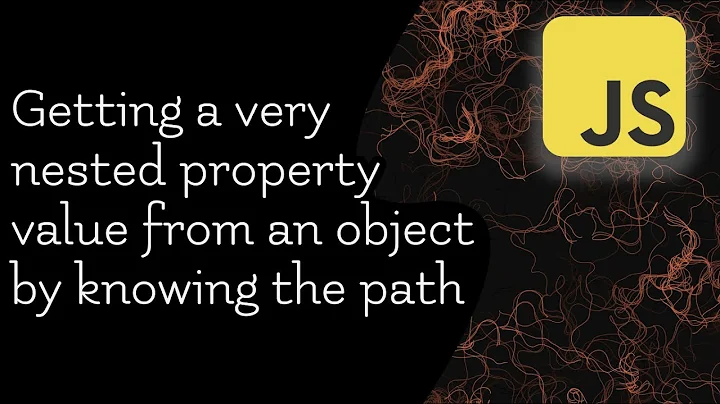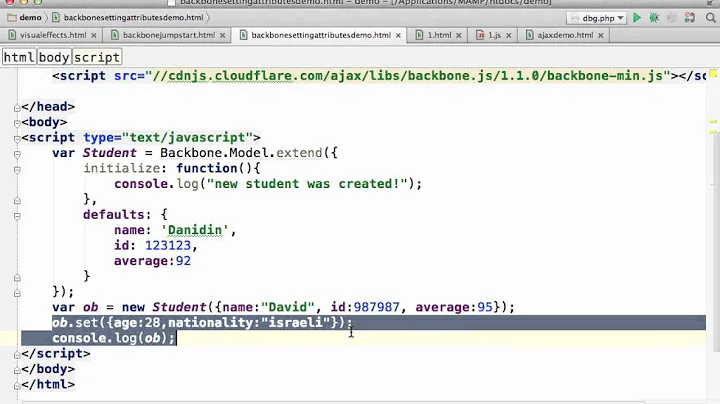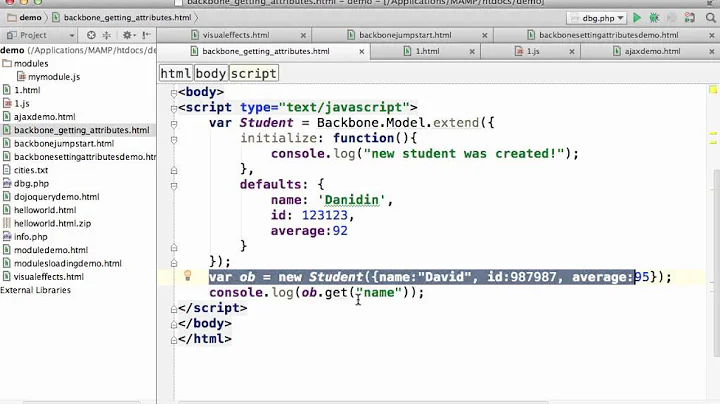Backbone.js get and set nested object attribute
Solution 1
While this.model.get("obj1").myAttribute1 is fine, it's a bit problematic because then you might be tempted to do the same type of thing for set, i.e.
this.model.get("obj1").myAttribute1 = true;
But if you do this, you won't get the benefits of Backbone models for myAttribute1, like change events or validation.
A better solution would be to never nest POJSOs ("plain old JavaScript objects") in your models, and instead nest custom model classes. So it would look something like this:
var Obj = Backbone.Model.extend({
defaults: {
myAttribute1: false,
myAttribute2: true
}
});
var MyModel = Backbone.Model.extend({
initialize: function () {
this.set("obj1", new Obj());
}
});
Then the accessing code would be
var x = this.model.get("obj1").get("myAttribute1");
but more importantly the setting code would be
this.model.get("obj1").set({ myAttribute1: true });
which will fire appropriate change events and the like. Working example here: http://jsfiddle.net/g3U7j/
Solution 2
I created backbone-deep-model for this - just extend Backbone.DeepModel instead of Backbone.Model and you can then use paths to get/set nested model attributes. It maintains change events too.
model.bind('change:user.name.first', function(){...});
model.set({'user.name.first': 'Eric'});
model.get('user.name.first'); //Eric
Solution 3
Domenic's solution will work however each new MyModel will point to the same instance of Obj. To avoid this, MyModel should look like:
var MyModel = Backbone.Model.extend({
initialize: function() {
myDefaults = {
obj1: new Obj()
}
this.set(myDefaults);
}
});
See c3rin's answer @ https://stackoverflow.com/a/6364480/1072653 for a full explanation.
Solution 4
I use this approach.
If you have a Backbone model like this:
var nestedAttrModel = new Backbone.Model({
a: {b: 1, c: 2}
});
You can set the attribute "a.b" with:
var _a = _.omit(nestedAttrModel.get('a')); // from underscore.js
_a.b = 3;
nestedAttrModel.set('a', _a);
Now your model will have attributes like:
{a: {b: 3, c: 2}}
with the "change" event fired.
Solution 5
There is one solution nobody thought of yet which is lots to use. You indeed can't set nested attributes directly, unless you use a third party library which you probably don't want. However what you can do is make a clone of the original dictionary, set the nested property there and than set that whole dictionary. Piece of cake.
//How model.obj1 looks like
obj1: {
myAttribute1: false,
myAttribute2: true,
anotherNestedDict: {
myAttribute3: false
}
}
//Make a clone of it
var cloneOfObject1 = JSON.parse(JSON.stringify(this.model.get('obj1')));
//Let's day we want to change myAttribute1 to false and myAttribute3 to true
cloneOfObject1.myAttribute2 = false;
cloneOfObject1.anotherNestedDict.myAttribute3 = true;
//And now we set the whole dictionary
this.model.set('obj1', cloneOfObject1);
//Job done, happy birthday
Related videos on Youtube
fortuneRice
Updated on July 08, 2022Comments
-
fortuneRice almost 2 years
I have a simple question about Backbone.js' get and set functions.
1) With the code below, how can I 'get' or 'set' obj1.myAttribute1 directly?
Another question:
2) In the Model, aside from the defaults object, where can/should I declare my model's other attributes, such that they can be accessed via Backbone's get and set methods?
var MyModel = Backbone.Model.extend({ defaults: { obj1 : { "myAttribute1" : false, "myAttribute2" : true, } } }) var MyView = Backbone.View.extend({ myFunc: function(){ console.log(this.model.get("obj1")); //returns the obj1 object //but how do I get obj1.myAttribute1 directly so that it returns false? } });I know I can do:
this.model.get("obj1").myAttribute1;but is that good practice?
-
freethejazz about 10 yearsWhile it isn't an answer to the question: Whenever specifying an object (anything passed by reference) in
defaults(obj1 in this case), that same object will be shared across all instances of the model. The current practice is to definedefaultsas a function that returns an object to be used as defaults. backbonejs.org/#Model-defaults (see the italicized note) -
 T J over 9 years@JonathanF Comments aren't meant for answers so you never needed the declaration :)
T J over 9 years@JonathanF Comments aren't meant for answers so you never needed the declaration :)
-
-
Bill Eisenhauer almost 13 yearsTo this answer, I would add the advisement that this solution teeters on widespread Law of Demeter violations. I would consider adding convenience methods that hide the navigation to the nested object. Basically, your callers don't need to know the model's internal structure; after all, it may change and the callers should be none the wiser.
-
 wilsonpage over 12 yearsCan't get this to work for me. Throws error:
wilsonpage over 12 yearsCan't get this to work for me. Throws error:Uncaught TypeError: Object #<Object> has no method 'set' -
Benno almost 12 yearsYeah, this doesn't work for me either... I get the same error as pagewil. I was doing:
window.Helper = Backbone.Model.extend({ defaults: { "type": null, "notes": [] } }); window.Events = Backbone.Model.extend({ defaults: { "title": null, "data": new Helper() } } });(didnt work withmodel.get("data").get("type")) -
Christian Nunciato almost 12 yearsget("attr") returns a plain object, not a Backbone model, so get("attr").set({any: "thing"}) doesn't work.
-
Domenic almost 12 years@ChristianNunciato, pagewil, Benno: You seem to have missed the point of the post, which is to nest Backbone models inside Backbone models. Don't nest plain objects inside Backbone models. Working example here: jsfiddle.net/g3U7j
-
Domenic over 11 yearsFor future readers, my answer has been updated to incorporate the best of Rusty's answer.
-
Jon Raasch over 11 yearsAsker should flag this as the accepted answer. Domenic's is a great start, but this solves an issue with it.
-
tom over 11 yearsI didn't inspect backbone.js code, but from my test, if you have a nested custom Model and change a property of it with set(), its parent model will not fire a 'change' event itself; I had to fire the event myself. I really should just inspect the code, but is this your understanding too?
-
Domenic over 11 years@tom that is correct. Backbone doesn't special-case for when properties of models are instances of
Backbone.Model, and then start doing magical event bubbling. -
maximus almost 11 years@Domenic: I have tried it, and the view doesn't change (render is not called) when model of a model is changed. How to connect them to View's render?
-
maximus almost 11 years@Domenic: For example, do I have to call this.listenTo(this.model, "change", this.render); then to call: this.listenTo(this.model.get("obj1"), "change", this.render); etc?
-
HungryCoder almost 11 yearsAre you sure about this? this does not work for me.
meta2= m.get('x'); meta2.id=110; m.set('x', meta2). This does not trigger any change event for me :( -
HungryCoder almost 11 yearsI see it works when I clone the attribute like
_.clone(m.get('x')). thanks -
 user10 over 10 years@Domenic If we model our data like you describe above, we have to customize model's parse function to set values to obj1. Am i correct?
user10 over 10 years@Domenic If we model our data like you describe above, we have to customize model's parse function to set values to obj1. Am i correct? -
Derek Dahmer over 10 yearsThanks @HungryCoder it worked for me too when cloned. Backbone must compare the object you are
settingwith the object you aregettingat set time. So if you don't clone then the two objects, then the two objects being compared are exactly the same at set time. -
tawheed over 10 yearsYes it does, if you look at the API there is an example like
//You can use index notation to fetch from arrays console.log(model.get('otherSpies.0.name')) //'Lana' -
mariachi about 10 yearsWorks great! But does line 2 in your example require a colon instead of a comma?
-
ambar almost 9 years@Domenic while doing something similar this.model.get("eventListener").set({"id":2}) Following exception was thrown: "Uncaught TypeError: this.model.get(...).set is not a function" Same goes for using nested get() .
-
 allthesignals over 8 yearsI'm confused. I'm simply trying to access attributes of a model, but seeing
allthesignals over 8 yearsI'm confused. I'm simply trying to access attributes of a model, but seeingget(...).get is not a function. From the model, I have toget('attributes')thenget('attribute')(For context, this is in a #groupBy loop called on a Backbone collection, in which the context passed is a Backbone model of the collection). -
 Setup almost 7 yearsHow would you go about and listen to change events of e.g. myAttribute1?
Setup almost 7 yearsHow would you go about and listen to change events of e.g. myAttribute1? -
 niall.campbell about 6 yearsRemember that objects are passed by reference and are mutable, unlike string and number primitives. Backbone's set and constructor methods attempt a shallow clone of any object reference passed as an argument. Any references to other objects in properties of that object aren't cloned. When you set it and retrieve it the reference is the same, which means you can mutate the model without triggering a change.
niall.campbell about 6 yearsRemember that objects are passed by reference and are mutable, unlike string and number primitives. Backbone's set and constructor methods attempt a shallow clone of any object reference passed as an argument. Any references to other objects in properties of that object aren't cloned. When you set it and retrieve it the reference is the same, which means you can mutate the model without triggering a change.






